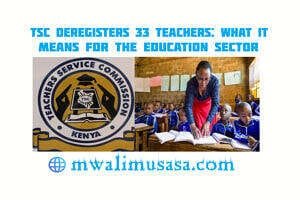How to Stand Out as a Junior Secondary School Teacher: Skills and Certifications to Pursue


The Competitive Landscape of Teaching
The teaching profession is experiencing an unprecedented surge in competitiveness, especially within the Teaching Service Commission (TSC) framework. As education systems evolve and develop, the demand for qualified teachers continues to rise. However, this growing demand has also attracted a multitude of new entrants into the profession, leading to an oversaturation of candidates vying for a limited number of positions. Many qualified individuals, equipped with degrees and teaching credentials, find themselves in a highly competitive job market, struggling to secure employment in schools.
Furthermore, specialized skills and certifications have become paramount in distinguishing oneself from other candidates. For instance, areas such as special education, digital literacy, and language acquisition are highly sought after. These specialized credentials not only reflect a teacher’s dedication to their craft but also demonstrate their adaptability to the diverse needs of students in today’s classroom environments. As the educational landscape continues to change, it’s clear that teachers must actively seek opportunities for professional development to stand out from the competition. This necessity sets the foundation for exploring the various skills and certifications junior secondary school teachers can pursue to enhance their qualifications and employability in the TSC system.
In-Demand Skills for Junior Secondary School Teachers
As education continues to evolve, the demand for specific skills among junior secondary school teachers has become increasingly pronounced. In particular, digital literacy has emerged as a critical competency for educators in today’s technology-driven classrooms. Familiarity with various educational technologies not only enhances teaching methods but also fosters student engagement. Effective integration of digital tools can lead to more interactive learning experiences, enabling teachers to present information in diverse formats and helping students to better grasp complex concepts.
Another vital skill is effective classroom management. A well-managed classroom environment contributes significantly to the educational experience. Teachers who master techniques to promote positive behavior and cultivate an inclusive atmosphere can substantially enhance student focus and participation. Implementing clear rules and engaging students through collaborative activities are practical strategies that support effective management. These practices not only benefit teachers by creating a conducive teaching environment but also encourage students to take ownership of their learning.
Adaptability is yet another essential skill for teachers in junior secondary schools. The ability to modify teaching approaches based on varying learning styles and needs is crucial, especially within the context of the Competency-Based Curriculum (CBC). In diverse classrooms, being able to pivot between different instructional methods ensures that all students receive tailored support, particularly those who may require additional assistance. For instance, employing both group work and individualized instruction can cater to various academic abilities, promoting inclusivity and enhancing overall student success.
Incorporating these in-demand skills can considerably improve the teaching experience and influence student outcomes positively. By emphasizing digital literacy, effective classroom management, and adaptability, junior secondary school teachers can better equip themselves to meet the increasing challenges and expectations within the education system.
Certifications That Add Value
In today’s competitive educational landscape, certifications play a pivotal role in enhancing the qualifications of junior secondary school teachers. Pursuing relevant certifications not only demonstrates a commitment to professional development but also equips teachers with essential skills that can benefit their students. Various certifications that can add significant value include those in special education, Information and Communication Technology (ICT) integration, and specific subject specializations.
Special education certifications prepare teachers to effectively support students with diverse learning needs. These qualifications help teachers develop tailored strategies that foster inclusivity within the classroom. By understanding the complexities of special education, teachers can create a more supportive learning environment, which can significantly impact student outcomes. Many institutions offer affordable online courses that facilitate this learning, making it accessible for teachers seeking to broaden their expertise.
Additionally, ICT integration certifications are increasingly important, as technology continues to evolve within the educational sector. These courses provide teachers with the skills necessary to incorporate various digital tools and resources into their teaching methodologies. Mastering ICT not only engages students in new ways but also prepares them for a technology-driven world. With numerous online platforms offering budget-friendly options, teachers can easily access training in effective technology integration.
Certifications in specific subject areas also provide a competitive advantage. Whether a teacher specializes in mathematics, science, or the humanities, advanced certifications can deepen subject knowledge and pedagogical skills. Many universities and professional bodies offer targeted training programs that are both affordable and flexible, enabling teachers to balance their professional development with existing commitments. Pursuing such certifications can greatly enhance a teacher’s qualifications, thus increasing their appeal in the job market.
Leveraging Skills to Boost Your Application and Interview Performance
When navigating the competitive landscape of job applications and interviews as a junior secondary school teacher, it is imperative to effectively showcase your skills and certifications. First, ensure that your resume and cover letter prominently display your relevant qualifications, particularly those geared towards effective teaching methodologies. Utilize bullet points to highlight key certifications, such as child psychology, classroom management, or subject-specific credentials, as these are pivotal in illustrating your readiness to educate young learners.
During the interview process, articulating your skills with confidence and clarity can significantly influence your chances of securing a position. When asked about your teaching philosophy or methods, directly reference specific skills that align with the role, such as your proficiency in technology integration or differentiated instruction techniques. Position yourself as an adaptive educator who is not only knowledgeable but also eager to implement innovative strategies in the classroom.
To further bolster your presentation, prepare examples that demonstrate your skills in action. For instance, if you possess strong communication skills, recount a situation where you effectively addressed diverse learning needs in your classroom. Examples not only provide evidence of your capabilities but also help potential employers visualize how you would fit into their teaching environment.
Moreover, anticipate common interview questions, such as “What strategies do you employ to engage students?” and prepare to weave your skills into your answers. This approach will not only enhance the substance of your responses but also reinforce your enthusiasm for the role. Practicing your delivery will ensure your responses resonate with interviewers while effectively portraying your dedication to fostering a positive learning atmosphere.
Conclusion
The education sector is increasingly competitive, requiring junior secondary school teachers to engage in continuous skill development to stay relevant and effective in their roles. As the landscape of teaching evolves, with advancements in educational technology and pedagogical strategies, it becomes imperative for educators to proactively enhance their skill sets. This dedication not only improves classroom performance but also significantly boosts employability opportunities.
One of the most critical factors for success in the teaching profession is obtaining relevant certifications and skills. Pursuing professional development programs and workshops can equip teachers with innovative techniques and current methodologies, ultimately enriching the learning experience for students. Staying informed about the latest trends in education ensures that teachers can adapt to changing educational environments and meet the diverse needs of their students.
The importance of continuous skill acquisition cannot be overstated. It conveys a commitment to professional excellence and demonstrates to employers a readiness to embrace new challenges. Furthermore, skills such as classroom management, effective communication, and technological proficiency foster a more conducive learning atmosphere, thus enhancing student engagement. All these elements work together to provide a competitive edge in an increasingly demanding job market.
In light of these considerations, it is essential for junior secondary school teachers to view their professional journey as a lifelong learning process. By actively seeking out opportunities for growth and development, teachers can cultivate their careers, ensuring sustainability and advancement in a dynamic educational landscape. The path to professional success as an educator lies in a proactive approach to skill development and certification, validating their dedication to continuous improvement in teaching practices.






